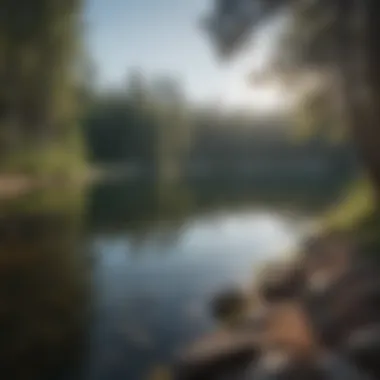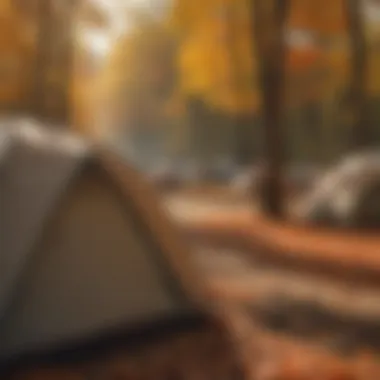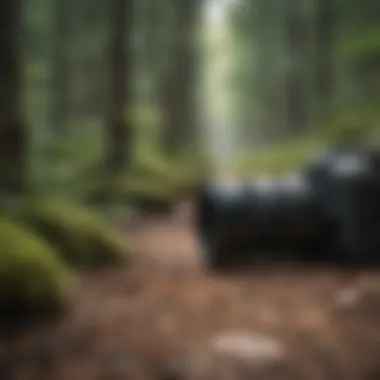The Ultimate Camping Guide to Michigan's Best Locations


Intro
Camping in Michigan offers a unique opportunity for outdoor enthusiasts to connect with nature and explore a variety of landscapes. From dense forests to vast lakeshores, the state presents a diverse range of camping experiences suitable for everyone. This guide aims to illuminate these varied locations, enabling readers to make informed decisions about their next camping adventure.
Michigan's natural beauty includes more than a thousand campgrounds situated in state parks, national forests, and along sandy shores. Each site presents its own set of services, scenery, and access to outdoor activities such as hiking, fishing, and water sports. Whether you seek solitude in the wilderness or a family-friendly site with amenities, this guide covers essential details to aid in your selection.
Camping not only allows for leisure and recreation but also fosters an appreciation for the environment. By understanding key factors about each destination, campers can enjoy a safe and memorable experience while respecting the natural world. The following sections will provide an organized overview of what Michigan has to offer, highlighting the individual charm and advantages of various camping locations.
Overview of Camping in Michigan
Camping in Michigan holds significant value for outdoor enthusiasts and nature lovers. The state is endowed with vast landscapes, diverse ecosystems, and a wealth of camping opportunities. This article aims to present a thorough exploration of Michigan’s unique camping experience, highlighting various locations, types of camping, and the associated benefits. Understanding the nuances of camping in Michigan can greatly enhance one’s connection to nature and improve overall outdoor skills.
The Popularity of Camping
Camping in Michigan has gained immense popularity over the years. Various factors contribute to this trend. First, the state features over 1,000 campgrounds, facilitating access to a range of outdoor activities, suitable for families, solo adventurers, or groups. Additionally, Michigan's breathtaking natural beauty, including the Great Lakes and numerous parks, attracts visitors seeking both relaxation and adventure.
Moreover, many Michiganders regard camping as a time-honored tradition, which is passed down through generations. It fosters a sense of community and connection among families and friends. According to data from the Michigan Department of Natural Resources, camping continues to grow year after year, demonstrating the enduring appeal of this outdoor pastime.
Different Types of Camping Experiences
The camping experience in Michigan varies widely, offering something for everyone. First, traditional tent camping remains popular, appealing to those who wish to immerse themselves closely in nature. Campsites range from minimally developed areas to fully equipped sites with amenities.
Moreover, campers find options for RV camping, which combines the joy of the outdoors with the comforts of a home on wheels. Many campgrounds cater specifically to RV enthusiasts, providing electrical hookups and waste disposal facilities.
For nature lovers seeking unique experiences, backcountry camping is available in places like the Porcupine Mountains. This option requires more preparation but rewards campers with solitude and unspoiled wilderness.
Recently, glamping has emerged as a luxurious alternative, featuring comfortable accommodations, elegant tents, and even yurts. This trend attracts those who desire a connection to nature without sacrificing comfort.
In summary, Michigan offers a diverse array of camping experiences sure to please everyone from novice campers to seasoned adventurers.
State Parks for Camping
State parks in Michigan are among the most cherished destinations for campers seeking natural beauty and recreational activities. These parks provide well-maintained facilities, access to various outdoor experiences, and opportunities to witness the local flora and fauna in their natural habitat. Many state parks offer campgrounds equipped with amenities such as restrooms, fire pits, and sometimes even laundry facilities. This encourages both novice and seasoned campers to immerse themselves in nature while maintaining a level of comfort.
In addition to physical facilities, state parks often feature hiking trails, lakes for fishing or swimming, and wildlife observation areas. This makes them ideal spots for families, educators, and animal lovers looking to explore the great outdoors. Moreover, the diverse landscapes—from sandy dunes to dense forests—cater to different interests and activities. Thus, they hold a significant place in the camping experience within Michigan.
Ludington State Park
Ludington State Park is one of Michigan's most popular parks, situated along the Lake Michigan shoreline. Covering over 5,300 acres, it has a mix of forest and beach areas, making it an excellent choice for a variety of outdoor activities. Visitors can camp in either rustic or modern sites. The park also features amenities like picnic areas, restrooms, and shower facilities, allowing for a more comfortable stay.
Known for its scenic sand dunes, Ludington State Park showcases a network of trails for hiking and biking. The park provides direct access to Lake Michigan, where swimming and boating activities are quite popular. Furthermore, the nearby Ludington Lighthouse offers opportunities for stunning photographs and sightseeing.
Porcupine Mountains Wilderness State Park
Porcupine Mountains Wilderness State Park, often called the 'Porkies,' is arguably one of the most breathtaking state parks in Michigan. Covering over 60,000 acres, it is immensely valued for its untouched wilderness. Visitors here can enjoy backcountry camping, which offers a more rugged experience. The sites are nestled within the heavy forest, allowing for a unique retreat into nature.
The park is famous for its panoramic views, particularly from the Summit Peak observation tower. Hiking trails meander through diverse ecosystems, featuring waterfalls, rivers, and ancient hemlock forests. It attracts wildlife enthusiasts, eager to spot animals like black bears and deer in their natural habitats.
Bald Mountain State Recreation Area
Bald Mountain State Recreation Area presents another impressive location for campers who appreciate diverse landscapes. Located in the Detroit area, it offers proximity to urban conveniences while providing a natural escape. The area includes many hiking trails and is ideal for biking and horseback riding.
Camping here can take place at well-equipped sites, catering to both tent and RV campers. The sprawling area features ponds and grassy fields, making it an inviting place for families and groups. It is not uncommon to spot various bird species, adding to the park's allure for bird watchers. The balance of accessibility and natural beauty makes Bald Mountain a favored spot for a quick getaway.
"Michigan state parks offer some of the best camping experiences, blending accessibility with the beauty of nature."
In summary, Michigan's state parks provide campers with unique and diverse environments that appeal to a wide audience. Each park has its own characteristics, making every visit a potential new adventure.
National Forests with Camping Options


National forests provide a unique opportunity for camping enthusiasts to immerse themselves in Michigan's pristine wilderness. These areas are more than just vast stretches of land; they are ecosystems rich in biodiversity, offering various recreational activities. Camping in national forests can enhance your outdoor experience through numerous benefits, including accessibility, solitude, and connection with nature.
One major consideration when choosing to camp in national forests is the diversity of landscapes available. From towering pines to serene lakes, these forests showcase Michigan's natural beauty. Additionally, the forests' management ensures sustainable practices that protect wildlife habitats while allowing visitors to explore.
Another significant aspect is the variety of camping styles available. Generally, national forests in Michigan offer both developed campgrounds with amenities and backcountry sites for those seeking a more rugged experience. Always check the specific regulations and permit requirements, as they can vary by location.
Forest camping not only nourishes the spirit; it also helps conserve natural resources and aerates the earth through thoughtful recreation practices.
Familiarizing oneself with the conditions and available facilities in these forests can notably improve the camping experience. For example, some areas may provide access to clean water, fire pits, and restroom facilities, while others may necessitate self-sufficiency. Understanding these factors is crucial for any outdoor adventure, ensuring safety and comfort.
Hiawatha National Forest
Hiawatha National Forest encompasses a significant portion of Michigan's Upper Peninsula, close to the shores of Lake Michigan and Lake Huron. This national forest features diverse landscapes, including wetlands, meadows, and dense forests. Camping here allows individuals to explore miles of hiking and biking trails.
The forest features several campgrounds, such as the Fayette Historic State Park. Visitors can enjoy historical architecture, scenic views, and proximity to fishing spots. The area's abundant wildlife, including deer and a variety of bird species, appeals to nature lovers.
Manistee National Forest
Manistee National Forest boasts proximity to Lake Michigan and offers a unique setting for campers. The area is known for its beautiful rivers and towering hardwoods. Campers here can experience a multitude of activities, such as canoeing, kayaking, and fishing in the pristine waters.
The well-maintained campgrounds include facilities for tent and RV camping. Places like Woods Landing Campground are equipped with restrooms and picnic areas. Wildlife enthusiasts can explore the varying habitats, as this forest is home to species ranging from black bears to various migratory birds.
Ottawa National Forest
Ottawa National Forest lies in Michigan’s western reaches and offers a unique combination of rugged terrain and serene woodlands. This area is rich in history, with some sites linked to Native American heritage. Campgrounds such as Porcupine Mountains State Park provide stunning vistas, especially in the fall when the foliage turns vibrant.
Visitors to Ottawa can partake in fishing, hiking, and even winter sports like snowshoeing and cross-country skiing. The forest’s trail systems cater to varying skill levels, making it achievable for families and serious adventurers alike. Wildlife observation is also prominent here, with many people coming to photograph local fauna in their natural habitats.
In summary, Michigan's national forests offer diverse camping options for everyone. The landscapes, activities, and wildlife create unique outdoor experiences, making these locations a highlight for any camping enthusiast.
Unique Camping Locations in Michigan
Unique camping locations in Michigan offer diverse experiences that stand out from traditional camping scenarios. These sites provide an opportunity to immerse in the natural beauty, culture, and activities that the region has to offer. Finding a unique camping spot can enhance your outdoor adventure, encouraging a deeper connection with the environment and the local community.
When considering unique locations, the blend of scenic vistas, recreational opportunities, and distinctive characteristics becomes vital. Many of these sites allow for both relaxation and adventure, making them accessible to a wide range of campers—from families to solo adventurers. It is important to also consider the amenities available at these locations, as they can vary greatly.
Camping near bodies of water, for example, may offer fishing, swimming, and boating. Meanwhile, sites with rich historical backgrounds, such as Mackinac Island, bring an added layer of intrigue to the camping experience. These unique locations often boast lesser-known trails and wildlife, giving you a glimpse of Michigan that many might overlook. Also, connecting with nature in these settings can provide valuable educational opportunities for those passionate about wildlife and ecosystems.
Beaches and Lakeside Camping
Lakeside camping in Michigan is a truly splendid experience. The state is home to countless beautiful lakes and pristine beaches, perfect for outdoor enthusiasts. Sites such as Lake Michigan shorelines and various inland lakes provide both peaceful backdrops and thrilling activities.
- Popular Lakeside Locations:
- Activities Available:
- Considerations:
- Silver Lake State Park: Offers dunes and ample camping spots near the water.
- Houghton Lake: Michigan's largest inland lake, ideal for fishing and boating.
- Swimming: Refreshing dips in the clear waters.
- Fishing: Anglers can find an array of fish species, such as bass and trout.
- Kayaking: Calm waters make for excellent kayaking and canoeing opportunities.
- Be aware of weather conditions. Storms can arise near the water.
- Many beaches have regulations regarding pets and fires, so check rules beforehand.
Camping on Mackinac Island
Mackinac Island presents a remarkably different camping experience. This island is known for its no-car policy, with transportation reliant on bicycles and horse-drawn carriages. The natural surroundings include stunning views of Lake Huron, historical sites, and charming architecture.
- Unique Features:
- Campsites Available:
- Activities to Enjoy:
- Historical Significance: The island is rich in history, with Fort Mackinac providing tours and events.
- Natural Landscapes: Hiking trails around the island reveal breathtaking views and native wildlife.
- Crown Point Campground: An exclusive spot offering tent camping among beautiful nature.
- Biking: Explore the island trails at your own pace.
- Horseback Riding: Immerse yourself in nature while riding along scenic paths.
- Sightseeing: Historical landmarks and unique sites are scattered throughout the island, ideal for education.


Mackinac Island offers a rare chance to combine history and outdoor adventure, making it a must-visit for campers looking for something out of the ordinary.
Essential Camping Gear and Preparations
Camping in Michigan demands thorough preparation. Having the right gear can elevate the experience and ensure safety, comfort, and enjoyment. This section covers essential camping gear and preparations, providing insights into tent selection, cooking equipment, and safety provisions.
Tent Selection and Setup
Choosing an appropriate tent is crucial. Consider size first. Tents come in various capacities, from solo sizes to family options. Think about how many people will join on your trip. A tent that fits everyone comfortably is essential.
Material matters too. Look for water-resistant fabrics, as Michigan's weather can change quickly. Models with good ventilation systems are appealing, providing airflow and reducing condensation inside.
Setup should be straightforward. Familiarize yourself with your tent before the trip. Practice pitching it at home or in a familiar space. This knowledge speeds up the setup process on-site, especially in challenging conditions. A well-set tent provides a safe space to regroup after outdoor activities.
Camping Cooking Equipment
When camping, proper cooking equipment enhances meals and overall enjoyment. A portable stove is vital. Consider models like the Coleman Triton or Jetboil MiniMo. They are compact and appropriate for outdoor environments.
Don’t forget utensils. Lightweight pots and pans, a sturdy cutting board, and basic cutlery are essential. Also, remember to pack a cooler if you plan to bring perishables.
Fuel sources are equally important. Check what type of fuel your stove uses. Propane canisters or non-toxic solid fuels are good options. Always have extra fuel to avoid surprises.
Safety Equipment and First Aid Kits
Safety must always be a priority while camping. Essential safety equipment includes a well-stocked first aid kit. Kits should have adhesive bandages, antiseptic wipes, and any necessary medications specific to individual needs. Also, include items like insect repellent, sunscreen, and a personal emergency whistle.
A multi-tool can be invaluable, serving various functions from cutting ropes to emergency repairs.
Consider having a portable phone charger or power bank as well. In case of emergencies, keeping communication lines open can be lifesaving. Check that it is fully charged before heading into remote areas.
"Preparation is key to enjoying your time outdoors. Take these essentials seriously."
By considering these aspects of essential camping gear and preparations, outdoor enthusiasts can ensure their safety and comfort while exploring the natural beauty of Michigan. Being properly equipped leads to a more enjoyable camping experience.
Activities Near Camping Sites
Engaging in activities near camping sites enhances the overall outdoor experience. It can transform a good trip into a memorable adventure. Michigan's varied landscapes offer a range of activities that cater to different interests and skill levels.
Hiking Trails
Hiking is one of the most popular outdoor activities. Michigan features diverse hiking trails for all abilities. Trails such as those in Ludington State Park and the Porcupine Mountains Wilderness State Park provide stunning views and chances to connect with nature.
Each trail offers unique features. Some lead to breathtaking vistas, while others meander through lush forests. The varying difficulty levels mean everyone from beginners to seasoned hikers can find suitable paths.
These trails not only promote physical activity but also allow for discovery and appreciation of Michigan’s flora and fauna. Being aware of trail markers and guidelines ensures safety and preserves the environment.
Fishing Opportunities
Fishing is another significant outdoor activity for those camping in Michigan. With numerous lakes and rivers, the state offers abundant opportunities to cast a line. Each season brings different species to pursue, from bass in the summer to trout in the spring and fall.
Places like Hiawatha National Forest and Manistee National Forest are well-known for excellent fishing spots. Many campgrounds even provide boat rentals or access to fishing gear. Fishing fosters relaxation and can strengthen bonds with friends or family.
Be mindful of local regulations and license requirements. Responsible fishing practices help maintain fish populations and promote environmental sustainability.
Wildlife Watching
Wildlife watching brings campers closer to Michigan’s rich biodiversity. The state boasts various ecosystems, from wetlands to dense forests, housing many animal species. Observers may spot deer, foxes, or a variety of birds depending on the area.
Early mornings and late afternoons are often the best times for wildlife sightings. Quiet observation is key; making noise can scare animals away. Consider bringing binoculars for a clearer view without disturbing their natural behavior.


Additionally, learning about the native species can enrich your experience. Knowledge of local regulations protecting wildlife contributes to sustainable and responsible observation practices.
"Engaging with nature through activities like hiking and wildlife watching not only enhances personal joy but also fosters a deeper appreciation for the environment."
In summary, integrating these activities into camping plans elevates the experience in meaningful ways. Each activity offers distinct benefits and enhances the enjoyment of Michigan's beautiful outdoors.
Environmental Considerations
Camping in Michigan offers a beautiful escape into nature but comes with a responsibility. Environmental considerations are critical to ensure the preservation of these outdoor spaces for generations to come. By understanding the impact that campers can have, individuals can contribute positively to the ecosystem around them while enjoying their adventure.
Leave No Trace Principles
The Leave No Trace principles are essential for any outdoor enthusiast. These guidelines help minimize the human impact on nature. Here are some key principles to follow:
- Plan ahead and prepare: Understanding the area and its rules can prevent unnecessary issues.
- Travel and camp on durable surfaces: Stick to established trails and campsites to avoid damaging fragile ecosystems.
- Dispose of waste properly: Always pack out what you bring in. This includes trash, leftover food, and human waste.
- Leave what you find: Preserve natural features and artifacts. Taking rocks or plants can disrupt the environment.
- Minimize campfire impact: Use a camp stove instead. If fires are allowed, keep them small and use existing fire rings.
Following these principles can significantly lower the ecological footprint of campers, protecting Michigan's natural beauty.
Wildlife Protection Regulations
Wildlife protection regulations aim to safeguard Michigan's rich biodiversity. Adhering to these regulations is crucial for maintaining healthy ecosystems and ensuring that wildlife can thrive. Here are important regulations to consider:
- Keep a safe distance: Observing wildlife from afar minimizes stress to the animals and reduces the chance of dangerous encounters.
- Avoid feeding wildlife: Feeding animals disrupts their natural foraging habits and can lead to dependency on human food.
- Respect seasonal closures: Some areas may be off-limits during specific times of the year to protect nesting or breeding wildlife. Always check local guidelines.
By being informed about these regulations, campers not only protect wildlife but also enhance their own camping experience. Undisting the interaction between people and nature is integral to responsible camping.
"Preserving nature is not a luxury, but a necessity for survival."
Planning a Camping Trip
Planning a camping trip is a crucial phase in ensuring a successful and enjoyable outdoor experience. This section discusses vital elements that contribute to a well-organized trip, including timing, reservations, and preparedness. Understanding these aspects can enhance your adventure and ensure a smooth camping experience.
Best Times to Camp in Michigan
The timing of your camping trip is paramount. Michigan’s climate can be quite diverse, meaning that the best times to camp vary by region and personal preference. Typically, late spring through early fall is considered the prime camping season. From May to September, temperatures are generally comfortable, and the majority of campgrounds are open and fully staffed.
Here are a few points to consider:
- Spring (May to June): This period offers mild weather, blooming wildflowers, and fewer bugs compared to summer. It is a wonderful time for those who prefer solitude among nature. However, be prepared for occasional rain showers.
- Summer (July to August): The weather in summer is warm but can also mean crowded campgrounds. Popular attractions may require early reservations. Water activities are at their peak during this time, making it ideal for families and groups.
- Fall (September to October): Autumn provides a stunning backdrop with changing leaf colors. The weather remains pleasant, but nights can become chilly. This season is excellent for those who appreciate fewer crowds and cooler temperatures.
- Winter (November to April): For the adventurous type, winter camping is a possibility, though not for the faint-hearted. It requires specialized gear and preparation. Many state and national parks offer winter-specific activities like snowshoeing and cross-country skiing.
Ultimately, consider what activities you want to do and the type of environment you prefer when deciding your camping dates.
Reservation Systems and Fees
Making reservations well in advance is another essential planning aspect. Many popular campsites in Michigan require reservations, especially during the peak season. Understanding how reservation systems work will help you secure a spot at your desired location.
- State Park Reservations: Most state parks allow reservations up to six months in advance. You can book online through the Michigan State Parks website, which also provides detailed information about each campground's amenities.
- National Forests: Similar to state parks, many national forests have specific guidelines for making reservations. Sites like Hiawatha and Manistee typically have some first-come, first-served options, but popular areas fill up quickly.
- Fees: Camping fees vary by park and type of site chosen. Standard fees can range from $15 to $40 per night. Additional costs can include vehicle permits, service fees for reservations, and charges for amenities such as firewood or dump stations.
Remember to check if there are any discounts or passes available for frequent visitors, such as the Michigan State Parks Passport, which may save costs over many trips.
Proper planning in terms of timing and reservations ensures you avoid disappointment and enhances your overall camping experience.
Culmination
Camping in Michigan is a rewarding undertaking that combines nature, adventure, and serenity. This article has highlighted the variety of options available for outdoor enthusiasts, from state parks to national forests and unique sites. Each destination presents its own charm and benefits, catering to different preferences and experiences.
Summarizing the Camping Experience
Understanding the significance of camping in Michigan allows individuals to appreciate what the state has to offer. Michigan's natural beauty is abundant, and its landscapes are diverse, from picturesque lakes to dense forests.
Camping serves as an opportunity for connection—not only with nature but also with fellow campers and their loved ones. Here are some key elements of the camping experience in Michigan:
- Diverse Locations: Different places such as Ludington State Park or Mackinac Island provide various atmospheres and activities. You can choose between beach-side camping or secluded forest settings.
- Adventure and Activities: Popular outdoor activities, such as hiking, fishing, and wildlife watching, are available in several parks. This variety allows for a tailored camping experience.
- Educational Opportunities: Camping can be an educational venture. There are many ways to learn about local ecosystems and wildlife. Educators can conduct informative sessions in natural settings.
- Mental Health Benefits: Time spent in nature has been proven to enhance mental well-being. Breathing fresh air, away from urban distractions, contributes to stress relief and improved focus.
"Camping allows us to embrace simplicity and immerse ourselves in the beauty around us."
In summary, this article serves as a comprehensive guide, enabling readers to select their ideal camping destination in Michigan. Each location has advantages that cater to different needs. Planning thoroughly enhances the camping experience, leading to memorable adventures in the great outdoors.







